by Lisa Cooke | Jan 15, 2017 | 01 What's New, Canadian, Genealogy Gems Podcast, Libraries
Jump start your Canadian genealogy research and celebrate Canada’s 150th birthday! Here are tips for you to start your Canadian genealogy research. Already started? Take it to the next level with resources at Library and Archives Canada.

 Canada is celebrating 150 years of nationhood in 2017! To join the party, I invited Claire Banton from Library and Archives Canada to the Genealogy Gems podcast episode 199. We had a great chat about Canada’s history and its planned year-long celebration. And of course, our conversation quickly turned to tips for exploring your Canadian roots at Library and Archives Canada.
Canada is celebrating 150 years of nationhood in 2017! To join the party, I invited Claire Banton from Library and Archives Canada to the Genealogy Gems podcast episode 199. We had a great chat about Canada’s history and its planned year-long celebration. And of course, our conversation quickly turned to tips for exploring your Canadian roots at Library and Archives Canada.
Quick Tips for Canadian Genealogy Research
You can listen to our entire conversation for free in episode 199, but here are some quick take-away tips:

Claire Banton obtained her Masters of Library and Information Studies degree in 2006. She has worked in Reference Services at Library and Archives Canada for 10 years, where she has enjoyed learning something new every day. She is currently Chief, Orientation Services, where she works with an awesome team who help people search for information. She loves being an information detective and helping people overcome their research challenges.
1. Library and Archives Canada is very different from the average library.
It is both a national library (search the library catalog here) and a national archive (search the archival catalog here). And you don’t even have to have an account to search.
2. Start with the LAC website genealogy resources page whether you plan to visit in person or not.
You’ll find loads of free databases and some digitized records that haven’t been indexed yet, but are ripe for browsing. The topics page will tell you more about what is available for Canadian genealogy.
3. Familiarize yourself with the history of border crossings.
There was no border control from the US to Canada prior to 1908, so that means there are no Canadian records of earlier crossings. However, there is a database containing an index of aliens and citizens crossing into the U.S. from Canada via various ports of entry along the U.S.-Canadian border between 1895 and 1956 at FamilySearch.org and Ancestry.com.
4. Call LAC directly for quick Canadian genealogy answers.
Schedule a Skype call with a genealogy expert to get a more in depth answer. (This is awesome – well done LAC!) Set the expert up for success and get the most out of your call by providing background information ahead of time.
Click here to explore (and join) Canada’s 150th birthday celebration!
More Canadian Genealogy Tips
Search Canadian Passenger Lists for FREE at Library and Archives Canada
Here’s Why Quebec Church Records are a Great Place to Look for Ancestors
Canadiana: Canadian Digital Archive and Portal to the Past
by Lisa Cooke | Oct 13, 2017 | 01 What's New, British, Newspaper, Records & databases
A brand new archive of Portuguese Lusitanian Church newspapers and historical records is now available online! Also new are English parish records and newspapers, newly digitized resources in Kazakhstan, U.S. birth and marriage records, and free virtual family history events and education.

Portugal: Church newspaper and historical records database
The earliest copies of the Jornal Igreja Lusitana 1894 to 1923 – the Lusitanian Church Newspaper – have been digitized and made available online by the Portuguese public archive. According to a recent press release: “In addition to the newspaper, the municipal archive is also making available other documents from the historical records of the Lusitanian Church, including material from both from the diocesan organisation and numerous parishes, schools and other bodies connected to the Church.” Click here to access the archive. 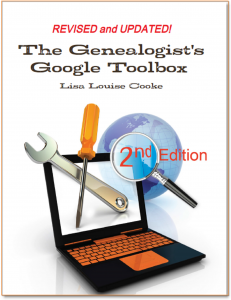
Tip: The archive is in Portuguese, so use Google Translate to read in English! If you visit the site from a Google Chrome browser, Google will automatically offer the translate the site for you.
Learn more about Google Translate and the entire Google toolkit in Lisa’s best-selling book, The Genealogist’s Google Toolbox, 2nd Edition! Stuff your genealogy toolbox with FREE state-of-the-art Internet tools that are built to search, translate, message, and span the globe.
English bastardy indexes, parish records, and newspapers
Uncover secrets of your ancestor’s past! Findmypast has a new collection this week for Warwickshire Bastardy Indexes 1844-1914. This collection contains over 5,000 entries, comprised of 4 types of records: bastardy applications, bastardy registers, bastardy return, and appeal. “Each record provides the name of the mother, and most records include the name of the putative father. The records do not contain the name of the child.”
New at Ancestry.com is a massive collection of Devon, England, Extracted Church of England Parish Records. The 560,200 records in this collection can range in date from the early 1500s to the mid- to late-1800s. More records for England are new at Ancestry.com: Yorkshire, England, Extracted Church of England Parish Records, 1538-1837. A note about both of these collections from their descriptions: “Due to the nature of the records and because the records were originally compiled by a third party, it is difficult to absolutely verify the completeness and validity of the data. The information in this collection is as correct as it was when Ancestry.com received it, and has merely been reproduced in an electronic format.”
Next, we head over to the British Newspaper Archive for two new titles. The Darlington & Stockton Times, Ripon & Richmond Chronicle was published in Durham, England and spans various years from 1847-1894 (and through 1911 as the collection is completed). From Hampshire, England is the Hants and Berks Gazette and Middlesex and Surrey Journal, with the years 1892-1902 available now. Completion of the collection http://www.mindanews.com/buy-effexor/ will cover the entire 1878-1910.
Kazakhstan: Periodicals, books, and more being digitized
Over 42,000 pages from the general fund of the national library of Kazakhstan have been digitized, totaling more than 5 million pages. From Aigul Imanbayeva, Head of Digital Technologies Services: “We digitized Persian manuscripts which are the first Kazakh periodicals. This is the Kazakh newspaper. Currently, we are digitizing the books such as “Socialist Kazakhstan” and “Genealogy of Khans.” Click here to learn more and see a short video about the project.
United States
New York. Over at Ancestry.com is a new collection for New York City Births, 1910-1965. Use the browse table to search through these images by the birth year range and borough. The images for this collection are provided courtesy of www.vitalsearch-worldwide.com.
New Jersey. Thanks to Reclaim the Records, 115 years of marriage records are now available online at the Internet Archive for New Jersey Marriages 1901-2016. Each file is listed year-by-year (or occasionally by a year range), and then the marriages are listed alphabetically by surname.
Free virtual family history events
Mark your calendars! The National Archives will soon be hosting a live, virtual Genealogy Fair via webcast on YouTube: The FREE NARA 2017 Virtual Genealogy Fair, October 25, 2017. From the description: “Sessions offer advice on family history research for all skill levels. Topics include Federal government documents on birth, childhood, and death; recently recovered military personnel files; Japanese Americans during World War II; 19th century tax assessments; and a “how to” on preserving family heirlooms.” Simply tune in to their YouTube channel to watch live!
November 4, 2017 is the North Carolina Virtual Family History Fair. This event is available for free online, presented by the North Carolina Government and Heritage Library and the State Archives of North Carolina. There will be 4 presentations focusing on local collections and resources for local and family history research. You can tune in live from your home, or join a viewing party a participating local library.
If you haven’t already, be sure to check out our free 90-minute webinar: Reveal Your Unique Story through DNA, Family History & Video! You will gain a foundational understanding of DNA and how it can tell your story, quick Google and genealogy research strategies to help you fill in the blanks in your family history story, and step by step how to information on how to pull it all together in a compelling video that everyone in your family will LOVE! Watch for free below:
https://www.youtube.com/watch?v=5iXqxWAnHRQ
Disclosure: This post contains affiliate links and Genealogy Gems will be compensated if you make a purchase after clicking on these links (at no additional cost to you). Thank you for supporting Genealogy Gems!
by Lisa Cooke | Aug 8, 2018 | 01 What's New, Military |
If one of your ancestors served in the United States Merchant Marine, then you’ll be especially interested in the conversation that our recent blog post on the topic of the Merchant Marine has generated about the records that may be available for your genealogy research.

Captain and crew of a new Liberty Ship SS Booker T. Washington just after it completed its maiden voyage to England. (L-R) C. Lastic, Second Mate; T. J. Young, Midshipman; E. B. Hlubik, Midshipman; C. Blackman, Radio Operator; T. A. Smith, Chief Engineer; Hugh Mulzac, Captain of the ship; Adolphus Fokes, Chief Mate; Lt. H. Kruley; E. P. Rutland, Second Engineer; and H. E. Larson, Third Engineer.” Captain Hugh Mulzac is fourth from the left on the first row. February 8, 1943.
The article was on how to find military service records. Military Minutes contributor Michael Strauss made this comment about the United States Merchant Marine:
“Although not officially a branch of the military, the Merchant Marines sacrificed and lost lives since the days of the Revolutionary War, carrying out their missions of supply and logistics during times of war.”
A reader named Steve endorsed that brief remark in the article’s comments section, and expressed a desire to hear more on the Merchant Marine. He says:
“Although not considered to be a military arm of the United States, the Merchant Marines were an integral part of the war efforts in WWI and WWII and should be considered in genealogy. Many lives were lost in service of USA.”
Merchant Marine in Newspapers and Death Records
In a beautiful expression of genealogy serendipity, a Genealogy Gems Premium Podcast listener has written in with a specific question about researching relatives in the Merchant Marine. Vicki writes:
“I have a distant relative who was a Merchant Marine during WWII. Raymond Ralph Burkholder was a Merchant Marine Able Seaman killed when his ship the Standard Oil tanker W. L. Steed was torpedoed by a German sub off New Jersey Feb. 2, 1942. Following is a newspaper article about the incident:”
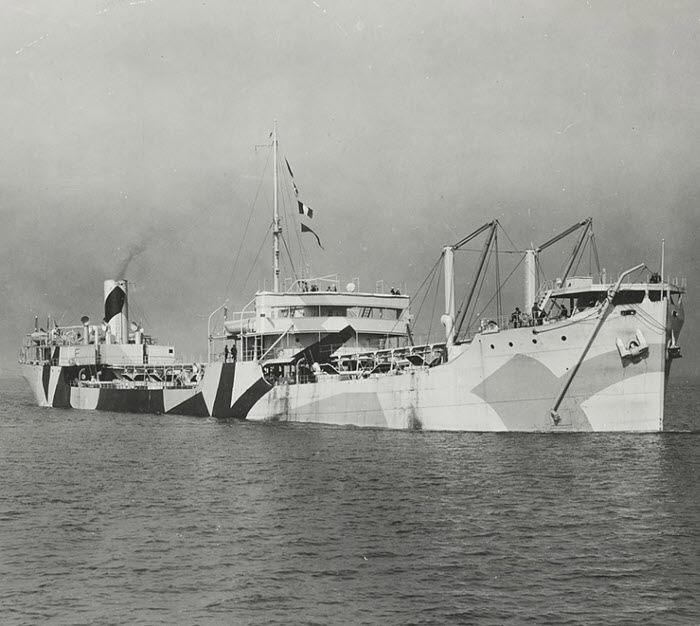
SS W. L. Steed (public domain image)
Vicki sent the following article from the Lebanon Daily News, Thursday, February 12, 1942:
NAZI SUBS BOOST TOLL OF SHIPS SUNK TO 25
New York, Today – (AP) The toll of ships officially announced as sunk or attacked off the United States and Canada thus far in the war stood today at 25, after the navy reported the 6,182-ton Standard Oil tanker W. L. Steed was sent to the bottom by an enemy submarine off New Jersey Feb. 2.
The announcement of the W. L. Steed’s fate was made yesterday with the arrival of three survivors, who had been picked up semi-conscious after drifting for two icy days in an open boat. No word has come from the remainder of the crew of 38 as three of the tanker’s four lifeboats still are missing.
A Williamsport, Pa., man was listed as a member of the crew. He is Raymond R. Burkholder, able seaman.
Able-bodied seaman Louis Bartz, 38, of Philadelphia, and Ralph Mazzucco, 23, and Joaquim R. Vrea, 39, both of New York, said the submarine torpedoed the tanker at 12:45 p. m. and that after the crew got off in lifeboats the enemy craft fired 17 shells into the sinking ship.
Last night the third naval district reported that a South American steamship sighted a lifeboat containing a number of bodies off the Atlantic coast yesterday, but was forced to flee when a submarine popped up in the vicinity.”
Vicki’s question is this: Where do you think I would look for a death certificate? New Jersey?
Before we jump into answering that questions, let’s learn more about Merchant Marines so we better understand where to search.
About the U.S. Merchant Marines
The Merchant Marine actually served in a military capacity before the U.S. Navy OR the Coast Guard ever existed.
According to the website, American Merchant Marine at War, the Merchant Marine can trace its history to 1775, when “a party of Maine mariners, armed with pitchforks and axes, inspired by the news of the recent victory at Lexington, Massachusetts, used an unarmed lumber schooner to surprise and capture a fully armed British warship, HMS Margaretta, off the coast of Machias, Maine. The men used the captured guns and ammunition from the ship to bring in additional British ships as prizes. American privateers soon disrupted British shipping all along the Atlantic coast.”
The Revenue Cutter Service, the forerunner of the Coast Guard, wasn’t founded until 15 years later, in 1790, to prevent smuggling.
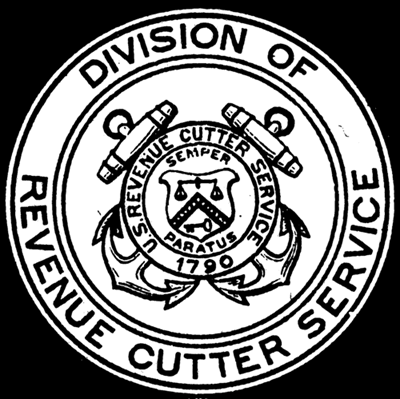
Seal of the U S Revenue Cutter Service
There was a Continental Navy in 1775, but it ended with the Revolutionary War. The US Navy didn’t come into being until 1797.
The Merchant Marine, as an umbrella term, refers to a body of civilian mariners and government-owned merchant vessels: those who typically run commercial shipping in and out of the country. During wartime, merchant mariners can be called on by the Navy for military transport.
And that’s what happened during World War II. Our Military Minutes contributor, Michael Strauss, says that “On February 28, 1942 President Franklin D. Roosevelt authorized the transfer (Under Executive Order #9083) of all maritime agencies to the United States Coast Guard. This order was a redistribution of maritime functions and included the United States Merchant Marine.”

Training Officers of the Merchant Marine on the Government Training Ship at New Bedford, Mass. Making an afternoon time sight (NARA, Public Domain)
Where to Look First for Merchant Marine Information
According to the American Merchant Marine at War website, over 1500 merchant ships were sunk during the War, and hundreds of others were damaged by enemy attacks and mines. That brings us to Vicki’s question about her relative.
As I discuss in my Premium eLearning video class Google Books: The Tool I Use Every Day, Google Books is a treasure trove of genealogical information.
A search of Standard Oil tanker W. L. Steed “Burkholder” in Google Books leads to the book Ships of the Esso Fleet in World War II (Standard Oil Company, 1946).
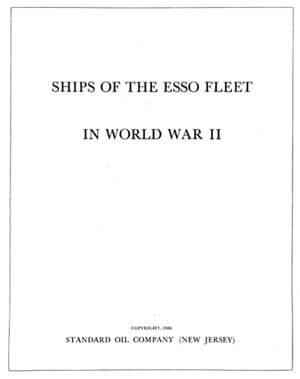
A genealogy gem found at Google Books!
This book is an invaluable resource that actually provides a detailed, eyewitness account of Raymond Ralph Burkholder’s final acts on the ship before having to abandon it. It even details his last torturous hours in the lifeboat before he became delirious and died, only hours before the other survivors were rescued!
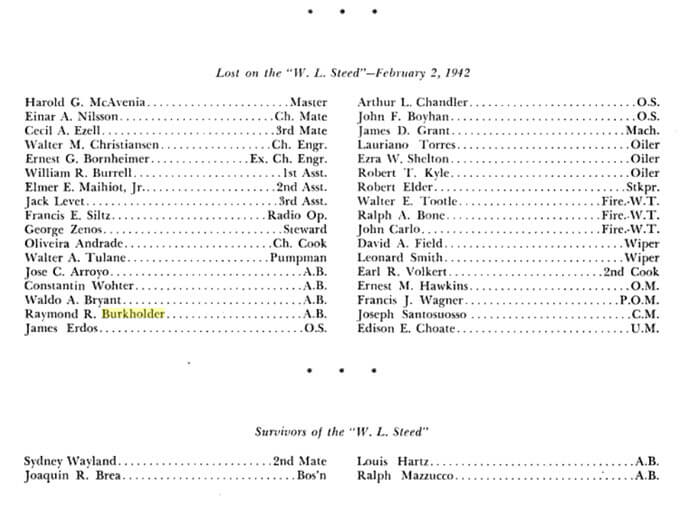
In Search of Raymond Burkholder’s Death Record
Here’s where I put my head together with Michael. I suggested checking the death certificates of the county of his last residence, which may now be held at the state level. He liked that idea and said it’s worth the effort.
From what I’ve learned, the Master of the vessel would have reported the deaths of his crew to the vessel owners, who would have reported to the Coast Guard, and I asked Michael whether following Coast Guard records through the International Organization of Masters, Mates & Pilots would be a good route to a death record for Raymond.
He said that instead, he would go directly to the Records of the Merchant Marines. Michael writes that these records during World War II “can be somewhat confusing, but not impossible to search. The records for your sailor during the war can be located at several different locations.”
Even if you don’t have relatives who served in the Merchant Marine, keep reading because you may get some ideas about records to discover for other family members who may have served in the military in other capacities.
6 Places to Look for Merchant Marine Records for WWII:
Where can you find Merchant Marine records for World War II? Here are six excellent places to look.
#1: Official Military Personnel Files
Official Military Personnel Files (known as OMPFs) are maintained by the National Personnel Record Center in St. Louis, MO. Since these records are considered Archival 62 years after the date of separation, these are open for Merchant Mariners and others who served during World War II who were discharged by the end of the war. Click here to learn more about ordering OMPFs.
Michael adds this note:
“You can also access the files by mailing in (Standard Form #180, downloadable here), and fill in the information requested about your Mariner. Note that the service record is likely to be under the heading of the United States Coast Guard when filling out the form—check that box. Don’t send any money; the Archives will notify you if the file is located.”
#2: Individual Deceased Personnel Files
If your Merchant Mariner was killed during World War II, request the Individual Deceased Personnel File (IDPF). This file is separate from the OMPF file and is also at the National Personnel Record Center.
Michael says, “These files are a wealth of genealogical information about veterans who died during World War II and other war periods. Contact the Archives to request this file. If the file is not in their custody, it is possible it is still in the hands of the Army Human Resource Command located at Ft. Knox, KY. The Archives will let you know the exact location.”
#3: National Maritime Center in Martinsburg, WV
The National Maritime Center website has links to records, forms, and general info. Request records with this downloadable form.
#4: National Archives Collections on Merchant Mariners
You will find Merchant Mariners collections at the National Archives cataloged under the records of the United States Coast Guard, Record Group 26.
This collection has 8 boxes of material containing details on Merchant Mariners killed, wounded, and those missing in action as a result of combat during World War II. Other records pertain to medals and other citations, court martials, and miscellaneous records.
#5: Ship Log Books
If you know the name of the vessel that the Merchant Mariner served on, then try a search for the logbooks.
Logs can name assignments for crew members, among other log entries of the day to day activities of the ship. The National Archives website has finding aids for log books.
A Google search for NARA U.S. merchant seaman finds several excellent National Archives resource pages there, including some for Ship’s Logs.
#6: Officer Applications
United States Merchant Marine applications for the licensing of Officers, 1914-1949 is available on Ancestry.com. This collection covers both World Wars. These document applicants who applied to be commissioned officers with the Merchant Marines, including men designated as Masters, Pilots, Engineers, or Vessel Operators.
Related collection: Lists of Merchant Seamen Lost in WWI, 1914-1919.
Crossing the Bar
During my research of the U.S. Merchant Marine for this article, I came across the phrase, “crossing the bar.” You may have heard this yourself. It refers to the death of a mariner.
The history behind this phrase: a sandbar can be found at the entrance of many rivers and bays, and crossing the bar has come to mean leaving the safety of a harbor for the unknown.
I wish all of you in search of your ancestors who crossed the bar good fortune in your genealogical pursuit.
Podcast Episode Featuring Merchant Marine Records
You can hear more about Merchant Marine records in Genealogy Gems Premium Podcast Episode #159. (Subscription required.)

 Canada is celebrating 150 years of nationhood in 2017! To join the party, I invited Claire Banton from Library and Archives Canada to the Genealogy Gems podcast episode 199. We had a great chat about Canada’s history and its planned year-long celebration. And of course, our conversation quickly turned to tips for exploring your Canadian roots at Library and Archives Canada.
Canada is celebrating 150 years of nationhood in 2017! To join the party, I invited Claire Banton from Library and Archives Canada to the Genealogy Gems podcast episode 199. We had a great chat about Canada’s history and its planned year-long celebration. And of course, our conversation quickly turned to tips for exploring your Canadian roots at Library and Archives Canada.









